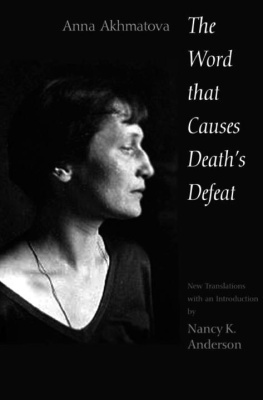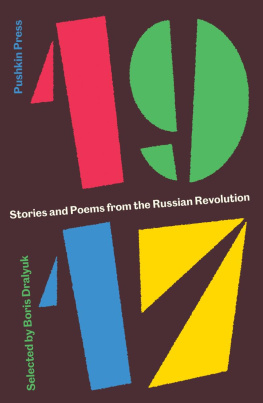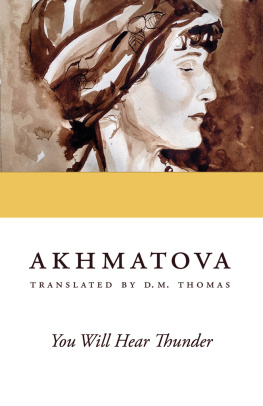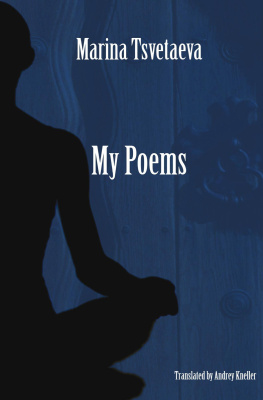White Flock Poetry of Anna Akhmatova Translated by Andrey Kneller
Copyrigh t Kneller, Boston, 2013 All rights reserved
For Len a and Sasha
The intensely personal lyricism of White Flock is tinged with the note that was destined to become her imprimatur: the note of controlled terror. The mechanism designed to keep in check emotions of a romantic nature proved to be as effective when applied to mortal fears. The latter was increasingly intertwined with the former until they resulted in emotional tautology, and White Flock mark the beginning of this process. With this collection, Russian poetry hit the real, non-calendar twentieth century but didnt disintegrate on impact -Joseph Brodsky The Keening Muse
A Note About Translation
Poetry is what is lost in translation Robert Frost Poetry is what is gained in translation Joseph Brodsky A poet, by definition, is a translator. He takes the seemingly incomprehensible ramblings of the Muse and transforms them into a language that can be understood and enjoyed by his audience. One can argue that something is already lost in this process.
No matter how good the poet, the audience wont experience what he undergoes in his interaction with the Muse. Or, as another Russian poet, Fyodor Tyutchev, writes in Silentium! : A thought once uttered is untrue. (as translated by V. Nabokov) This is a challenge for all translation in general. Translating poetry from one language to another often becomes a game of telephone, where one whispered message gets passed down the line, before it is finally revealed, usually with accumulated inaccuracies. The Muses message gets lost somewhere in-between and what is left is a mere frame, in which the original can hardly be discerned.
This experience leads people to say that one should avoid translated poetry altogether. If you subscribe to the absurdity of this logic, all poetry is doomed to fall short as it will never capture the essence of feelings and experiences. I would like to propose a different approach. Bad translations should be disregarded, no less than bad poetry. Readers should be wary of them as art collectors are wary of forged paintings. Translators of poetry need to be held to a much higher standard than simply relaying the general message.
Their work must retain as much semblance to the original as possible; in particular, translating rhyming poetry into blank verse should not be acceptable. The same principle should apply to rhyming translations that greatly distort the content, meaning and images of the poem for the sake of sound. Beyond this, good translations should effectively relay idioms, references and allusions in a way that doesnt make them appear strained. With this collection, I hope to show that such translations are possible. Great Russian poets, like Anna Akhmatova, deserve this much. And should I fall short in my attempts to reach the set standard, I would only be happy if another translator takes up the task and does it better than I.
Humbly, Andrey Kneller
Table of Contents I II III IV I *** : , , , , ,- . 12 1915 *** We thought: were poor and dont have anything, But as we started to lose one thing after another, So much that each day became A remembrance day, - We began to write songs About Gods immense generosity And the wealth we once had. April 12, 1915 *** . . , , . 1913 *** Ill leave your white house and your quiet garden. 1913 *** Ill leave your white house and your quiet garden.
May life become all bare and filled with light. Ill glorify you with a verse so ardent More than a woman couldve glorified. As you recall your dear beloveds eyes In heaven you yourself have fashioned, Im trading with the rarest merchandise - Im selling off your tenderness and passion. 1913 *** , , , . , . , ... - , . 1914 *** So many stones were cast that I dont cower When facing them and seeing them fly by, The pitfall turned into a slender tower That towers over towers in the sky. 1914 *** So many stones were cast that I dont cower When facing them and seeing them fly by, The pitfall turned into a slender tower That towers over towers in the sky.
Im thankful to the builders for its height, May all their grief and worries disappear. Up here, Im first to marvel at first light, And final rays are jubilant up here. And often winds from northern seas presume To burst in through the windows in my room And pigeons in my hands peck grains of wheat Even the page that I did not complete - The Muses tan, serene and steady hand Will certainly write out to the end. 1914 Slepnyovo ,
,
.
-..
.
.
. !
, !
,
, .
1916 Song about a song Like a cold wind at the start, It will burn and sear, Then itll fall into your heart As one salty tear.
The a ngry heart will then turn sad, Pitying some thing. Nonetheless, it wont forget This melancholys sting. I only sow. The others Will come to reap. So what! May God bless the harvest Of the reaping horde! And in attempts to not fall short In thanking you enough, This gift I give onto the world More permanent than love. , , . -, , . ! . , , . 1912 *** My voice is weak, but will will never weaken. 1912 *** My voice is weak, but will will never weaken.
Without love, Im more at ease, Im sure. The sky is high, the mountain wind is sweeping, And all my thoughts are innocent and pure. My nurse-insomnia has moved on down the block, Gray ashes do not cut me to the marrow, The crooked arrow of the towers clock No longer seems to me a lethal arrow. The pasts authority over the heart is ending! My freedoms near. Ill pardon all with time, Watching a ray ascending and descending Atop the moistened surface of a vine. , : " , , !" . , , , , . 1914 *** He was jealous, and anxious, and tender. 1914 *** He was jealous, and anxious, and tender.
And I was like Gods sun to him. To cut off her song of the days she remembered, He killed my white bird on a whim. He entered the front room at dusk and implored : Love me, laugh, and continue to write! And I buried the cheerful, jovial bird Near the well by the alder that night. I promised to him not to wallow in woe, But my heart turned to stone, cold and bare, And it seems to me, always, wherever I go, I will hear her sweet voice in the air. 1914 *** , ! , - , . , , , ! , , . 1914 *** Loves memory - a heavy weight! And I must sing upon its coals. 1914 *** Loves memory - a heavy weight! And I must sing upon its coals.
For others men, its blaze creates Some warmth for souls turned cold. To warm their sated bodies nightly, They need my tears and I lament Its not for this I sang, Almighty! Partaking in loves sacrament! Place down the poison right before me To take my voice out of my chest And wash away my shameful glory Into the gleaming nothingness. 1914 *** , . , . , ? ?.. 1912 *** The skys azure lacquer is waning And you can hear the ocarina play.
Shes just a little fife whos made of clay, What is the cause for all of her complaining? Who left all of my sins for her exposed? And why does she forgive me anyhow? Or is a voice reciting to me now The poetry you've recently composed?... 1912 *** - , . ... ? , , , ... , . 1913 *** Instead of wisdom experience was My fresh, non-quenching glass. 1913 *** Instead of wisdom experience was My fresh, non-quenching glass.
My youth was Sunday prayers words Could I forget my past? How many deserted roads w ere trod With him, who wasnt dear, How many times did I bow to God, For him, who was sincere I have become forgetful, whiling Time away, with no concern. Those lips unkissed and eyes unsmiling Will never be returned. 1913 *** ! . , , , . . . - , - ! , , . .. , . , , , , , ... , ! 1916 *** Ah! Here you come again. , ! 1916 *** Ah! Here you come again.
Not as a smitten youth, But as a man whos stern, unbending and uncouth, You walk inside and barely look up at me at all. The calm before the storm is frightening to my soul. You ask me what it was that I have done to you, Who offered up yourself with love and fate imbued. Instead I have betrayed. If you could one day tire And not repeat yourself and constantly inquire! To haunt his killers sleep, thus speaks the newly dead, An angel waits for death thus adjacent to the bed. Forgive me now.
Next page




